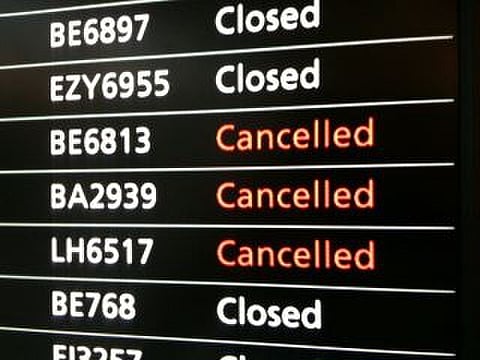

The U.S. aviation system entered a new phase of disruption as government-mandated flight cuts led to over a thousand cancellations for a second consecutive day, with airlines and travelers bracing for significantly more turbulence in the week ahead.
U.S. airlines canceled 1,460 flights on Saturday, November 8, following over 1,000 cancellations the previous day, as the Federal Aviation Administration's (FAA) order to reduce air traffic took effect . By the end of the weekend, the total number of canceled flights had surpassed 2,500 . The disruptions were not limited to cancellations; on Friday, more than 4,500 flights were delayed, causing widespread ripple effects across the national airspace . Airports in cities like Charlotte, North Carolina, were particularly hard hit, with 120 arriving and departing flights canceled on Saturday alone .
The cancellations are the direct result of an FAA mandate requiring airlines to cut a specific percentage of their flights at 40 of the nation's busiest airports . This is a scheduled and escalating plan designed to reduce strain on an air traffic control system where thousands of controllers have been working without pay for weeks due to the government shutdown . The reductions started at 4% on Friday, November 7 . The FAA has mandated that this figure will rise to 6% on Tuesday, November 11, and is scheduled to reach 10% by Friday, November 14 . Transportation Secretary Sean Duffy has warned that if the shutdown continues and more controllers are absent, flight cuts could potentially surge to 15-20% .
The fundamental reason for the flight cuts is a critical shortage of staffed air traffic control positions, exacerbated by the government shutdown. Over 13,000 air traffic controllers and 50,000 security screeners are being forced to work without pay, leading to increased absenteeism as many seek other sources of income to pay their bills . The system was already understaffed before the shutdown, and controllers are now working mandatory overtime, often for six days a week, without compensation . Since the shutdown began, there have been 482 reports of staffing problems at FAA facilities, a figure more than four times higher than the same period last year . This has led to significant delays, with flights heading to Ronald Reagan Washington National Airport experiencing average wait times of four hours, and other major hubs like Atlanta, Chicago O'Hare, and San Francisco facing delays of over an hour .
The travel disruptions are having a direct human impact, with some travelers missing weddings, surgeries, and family visits . In response, there has been a notable spike in one-way car rentals as some passengers seek alternative transportation . Analysts warn that if the cancellations continue to escalate into the Thanksgiving holiday period, the economic repercussions will widen, affecting tourism, hotel taxes, and city revenues . Furthermore, nearly half of all U.S. air freight is transported in the cargo holds of passenger aircraft. Major and prolonged flight disruptions could lead to higher shipping costs, which may eventually be passed on to consumers in the form of higher prices for goods .
As of November 9, the political impasse in Congress showed no signs of breaking. Senate Republicans rejected a pared-back proposal from Democrats, with one senior Republican aide calling the compromise "dead on arrival" . The administration has framed the flight cuts as a necessary safety measure, with officials stating that the goal is to manage a situation where low staffing levels and fatigue have a "direct impact on #safety" . Even if the government were to reopen soon, Transportation Secretary Duffy has indicated that flight schedules would not immediately return to normal, as it would take time for all air traffic controllers to return to their posts .